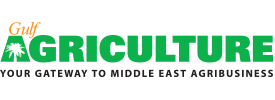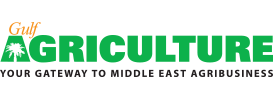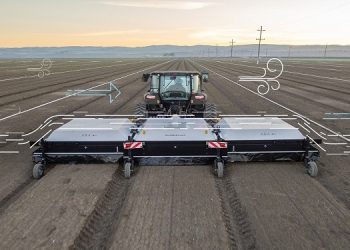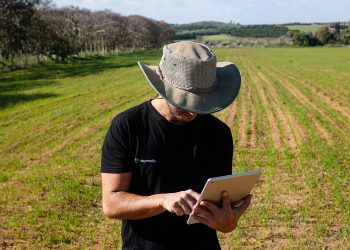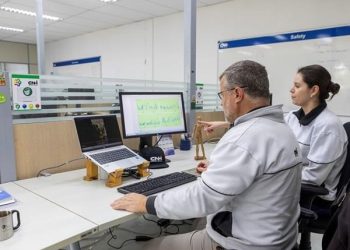ofi (olam food ingredients), a global leader in naturally good food and beverage ingredients, says developments in data and technology – from granular deforestation mapping and child labor monitoring to AI-powered carbon measurement tools – are accelerating progress towards its Cocoa Compass sustainability ambition. It is also providing food and beverage companies with enhanced traceability and transparency ahead of new regulations in Europe and beyond.
The latest Cocoa Compass highlights based on 2022 data include:
- New analysis showing over 30,168 farmers in ofi’s cocoa supply chain are earning a living income[1], putting the business on track to reach its 2030 target of 150,000 cocoa farmers earning a living income.
- A 395% increase in the number of children receiving education support in 2022, compared to the 2018 baseline.
- A 15% increase in the number of households covered by ofi’s Child Labor Monitoring and Remediation System (CLMRS).
- 6 million trees distributed by ofi, working with its customers and partners, for agroforestry and income diversification, from 2018 to 2022.
- 79% of farms in ofi’s sustainability programs have been polygon mapped [2]
United States Agency for International Development (USAID), Indonesia Mission Director, Jeff Cohen, said: “We are proud to be working together with ofi and the Hershey Company to encourage cocoa farmers to adopt more sustainable agriculture practices—like diversifying their crops and allowing more trees to remain on their land—which will strengthen their resilience against climate shocks and improve their livelihoods[3].”
Critical to delivering impact with USAID and other partners is technology. ofi’s latest advancements leverage the capabilities of its sustainability management system, AtSource. This technology can be available to customers upon request, providing companies with detailed data and insights on where and how their cocoa and other ofi ingredients[4] are sourced, including their social and environmental impact. It also complements specific solutions that ofi is implementing to prepare for the incoming European Deforestation Regulation (EUDR). The technology includes:
- A Carbon Stock Monitoring and Measurement tool[5] – created in partnership with geospatial specialists NGIS – uses AI-powered analysis to provide high-quality data on forest cover and tree loss to help customers monitor for deforestation, as well as understand how interventions like agroforestry and shade tree planting affect carbon stocks across different plots of land.
- An award-winning[6] Carbon Scenario Planner that enables customers to understand the impact of different agricultural practices on GHG emissions and model the most efficient methods for reducing greenhouse gas emissions in their supply chain and delivering on their Scope 3 emissions targets.
- An updated Cocoa Farmer Income Tool, which shows detailed income estimates for a representative sample of farmers in ofi’s cocoa sustainability programs. The tool provides a clearer picture of where actions on the ground are helping cocoa farmers earn more, as well as where customers can partner with ofi on initiatives to help close income gaps.
ofi Cocoa, Managing Director & CEO, Tejinder Singh Saraon said: “The granularity of our data, coupled with our extensive footprint on the ground in origin countries and strong relationships with farmers, means we can continue to move the needle with collaborators like USAID. We’re also investing in technology to help some of the world’s biggest food and beverage brands meet the demand from their consumers for delicious, on-trend products with robust sustainability credentials. I’m incredibly grateful that our customers continue to partner with us on our Cocoa Compass sustainability journey. Although there are no easy solutions to the complex challenges facing cocoa farmers and the natural world, I’m proud of the impact we’re having together.”
Cocoa Compass was launched in 2019 as ofi’s ambition to collaborate with its customers, partners, and governments to play its part in making the future of cocoa more sustainable. It set challenging 2030 goals in alignment with the United Nations Sustainable Development Goals (UNSDGs). In 2020, the company achieved its first set of Cocoa Compass targets, which included implementing 100% traceability and deforestation monitoring in its direct cocoa supply chain to farm or community[7].
ofi now plans to announce a refreshed Cocoa Compass ambition in the latter half of 2024. This will not only incorporate learnings from the past five years and leverage the impact of its on-the-ground programs in cocoa communities but also reinforce ofi’s broader sustainability strategy.
ofi’s full Cocoa Compass 2022 Impact Report is available here.
Discover much more about what ofi has to offer at ofi.com
[1] The analysis covered a broad sample of farmers from ofi’s sustainability programs. ofi adopts the guidance of the Living Income Community of Practice (LICOP): “The net annual income required for a household in a particular place to afford a decent standard of living for all members of that household. Elements of a decent standard of living include food, water, housing, education, healthcare, transport, clothing, and other essential needs including provision for unexpected events.” ofi is working with LICOP and others to develop living income metrics, acknowledging that consensus for a globally accepted methodology requires time and that specific norms and methods may vary from region to region.
[2] Polygon mapping not only maps the landscape around a cocoa farm but traces its perimeter using GPS polygons and can ensure that the volume of cocoa purchased respects the farm’s capacity.
[3] The program is called the Landscape Approach to Sustainable and Climate Change Resilient Cocoa and Coffee Agroforestry (LASCARCOCO).
[4] The Carbon Stock Monitoring and Measurement tool and the Carbon Scenario Planner are being used by ofi’s cocoa, coffee and nuts platforms. The Farmer Income Tool referenced is currently only available for ofi’s cocoa platform.
[5] Shortlisted for Edie-Net Zero Innovation Award 2024
[6] Winner of the Sustainability Innovation Award category at the FIE Awards 2023.
[7] Volumes procured directly from farmers or from farming co-operatives, farmer groups, community/ growing areas, or their representatives (including Local Buying Agents who are restricted to a specific community/growing area).

